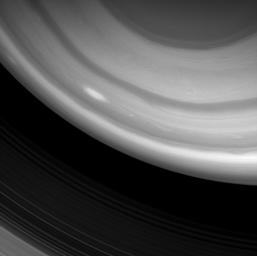
|
High Clouds Aloft
- Click the image above for a larger view
- Full-Res JPEG (1011 x 1007) (69.1 kB)
- Full-Res TIFF (1011 x 1007) (1.0 MB)
Caption:
A Cassini spacecraft image captures a bright, oblong storm swirling high through the middle latitudes of the southern hemisphere.
The image was taken through a spectral filter centered on wavelengths of light that are strongly absorbed by methane gas. Hence, any light making it through this filter to the camera's detector has bounced off clouds that are high in the atmosphere, making them visible, while light passing through the cloud-free surroundings gets absorbed by the methane gas there before it reaches the lower clouds.
The image was taken with the Cassini spacecraft wide-angle camera on Jan. 5, 2009 using a spectral filter sensitive to wavelengths of near-infrared light centered at 890 nanometers. The view was acquired at a distance of approximately 711,000 kilometers (442,000 miles) from Saturn and at a Sun-Saturn-spacecraft, or phase, angle of 106 degrees. Image scale is 39 kilometers (24 miles) per pixel.
Background Info:
The Cassini-Huygens mission is a cooperative project of NASA, the European Space Agency and the Italian Space Agency. The Jet Propulsion Laboratory, a division of the California Institute of Technology in Pasadena, manages the mission for NASA's Science Mission Directorate, Washington, D.C. The Cassini orbiter and its two onboard cameras were designed, developed and assembled at JPL. The imaging operations center is based at the Space Science Institute in Boulder, Colo.
For more information about the Cassini-Huygens mission visit http://saturn.jpl.nasa.gov/ . The Cassini imaging team homepage is at http://ciclops.org .
Cataloging Keywords:
| Name | Value | Additional Values |
|---|---|---|
| Target | Saturn Rings | Saturn |
| System | Saturn | |
| Target Type | Ring | Planet |
| Mission | Cassini-Huygens | |
| Instrument Host | Cassini Orbiter | |
| Host Type | Orbiter | |
| Instrument | Imaging Science Subsystem (ISS) | |
| Detector | Wide Angle Camera | |
| Extra Keywords | Atmosphere, Grayscale, Infrared, Methane, Storm, Visual | |
| Acquisition Date | ||
| Release Date | 2009-02-17 | |
| Date in Caption | 2009-01-05 | |
| Image Credit | NASA/JPL/Space Science Institute | |
| Source | photojournal.jpl.nasa.gov/catalog/PIA10580 | |
| Identifier | PIA10580 | |
